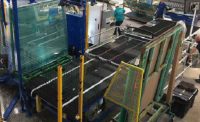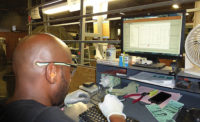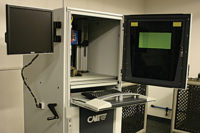Tier 2 suppliers may be less well-known than Tier 1 suppliers and OEMs, but that doesn’t mean their role in the manufacturing chain is any less important. Danbury, CT-based Kimchuk Inc. is proof of that. Founded in 1964 as a small machine shop, the company has grown to become a frequent provider of engineering design and packaging services to the U.S military.
In fact, one of company president Jim Marquis’ proudest moments came in late 2009 when Kimchuk was recognized by the Connecticut Quality Improvement Award Partnership for work done on the Boomerang Sniper Detection System (BSDS). Originally developed by Raytheon BBN Technologies, the BSDS alerts soldiers to hostile incoming fire within one second, pinpoints the location of the shooter, and tells the operator the direction, distance and elevation of the shot.
According to Marquis, Kimchuk engineers redesigned the BSDS so it was about 50 percent less expensive to produce. The design changes included replacing some aspects of manual assembly with injection molding to create a much more compact product, and creating new packaging.
Kimchuk also serves as an electromechanical contract manufacturer to the U.S. military. Over the past several years, the company has manufactured a wide variety of PCB sets for nuclear and non-nuclear modules for the Navy; a tunnel detection system that detects digging and other seismic activities (via direct or satellite connection to a central monitor); and upgraded commercial products for military field use.
Having the right surface-mount-technology (SMT) equipment is essential for Kimchuk to produce high-quality PCBs used in electromechanical products for the U.S. military and many large companies in the nuclear energy, medical, telecom and security industries. For this reason, Kimchuk recently installed two KE-2080E SMT placement machines and a FX-3 chip shooter. All models are made by Juki Automation Systems.
“The machines have exceeded our expectations,” notes Steve Sconzo, director of manufacturing at Kimchuk. “To date, we have not had any parts we were unable to place.”
Kimchuk selected the KE-2080E machines to ensure that ball grid arrays and non-leaded quad flats are placed at the proper pitch onto PCBs. According to Sconzo, the FX-3 was purchased to replace the company’s outdated chip shooter and because it easily integrates with the KE-2080E.
All three machines are used on one production line. A second line features similar equipment from other suppliers, along with a state-of-the-art 3D solder paste inspection system.
The Juki equipment offers a low operating cost and a high rate of throughput, reliability and repeatability. Specific KE-2080E benefits include feeder setup verification (which drastically reduces line changeover times), component-placement accuracy, and producing PCBs that meet J-STD-001 and IPC-A-610 class 3 requirements. The FX-3 features integrated Cogiscan software that enables product traceability.
Sconzo says that Kimchuk intends to purchase similar SMT equipment in the near future for the second production line. For more information on SMT assembly equipment, call 919-460-0111 or visit www.jukiamericas.com.





